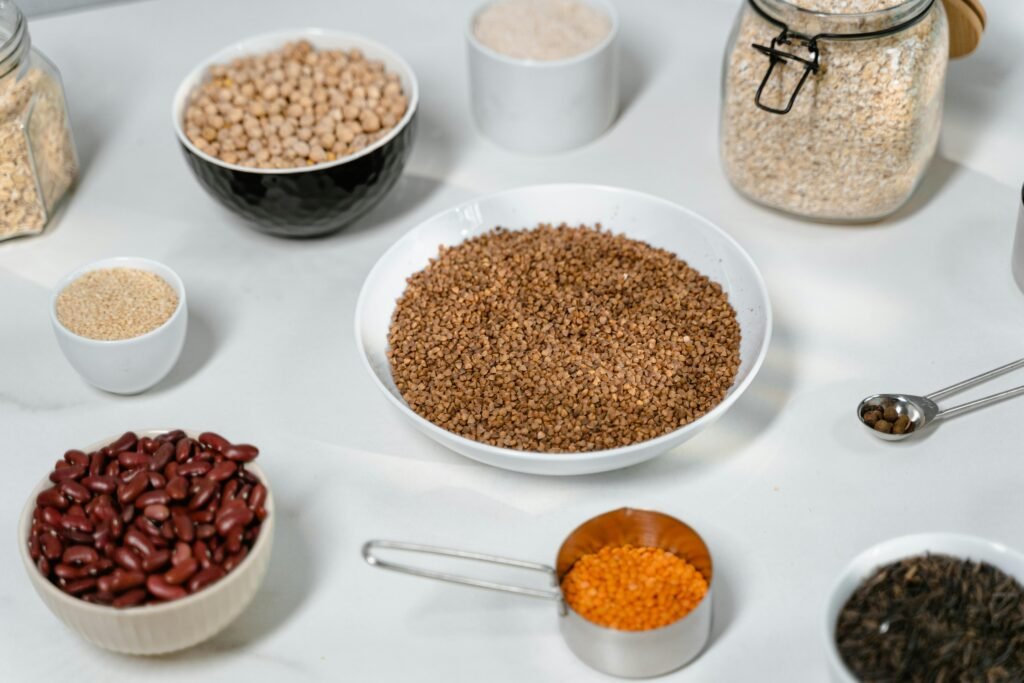
Why Protein Needs Can Feel Confusing
If you’ve researched how much protein to eat, you’ve probably seen wildly different advice:
- Fitness gurus recommending 130–180 grams a day
- Plant-based experts like PCRM saying most women meet their needs on a varied diet
- And now you’re left wondering: “What’s actually right for me?”
Where PCRM Starts
The Physicians Committee for Responsible Medicine (PCRM) sets the baseline for most healthy adults at 0.36 grams per pound of body weight (0.8 g per kg of body weight), or roughly 46 grams per day for many women.
That’s enough to meet minimum needs, but for women in midlife, especially those doing resistance training, it’s often not sufficient if you want to:
- Maintain or build lean muscle
- Support metabolic health
- Stay fuller, longer
- Prevent age-related muscle loss
Balanced by Plants’ Protein Goals
For most women in midlife who exercise a few times per week:
We like to aim for 0.55 to 0.73 grams of protein per pound of body weight
(roughly 1.2–1.6 grams per kilogram of body weight)
This range is ideal for women in perimenopause and postmenopause who are weight training 2–3 days per week, trying to lose fat, and looking to preserve or modestly increase lean muscle.
- Lower end (0.55 grams per pound (or 1.2 g per kg): Supports healthy muscle maintenance and metabolic health.
- Upper end (0.73 grams per pound (or 1.6 g per kg): Hits the “sweet spot” for optimizing muscle retention and strength gains during weight loss.
Why We Don’t Go Higher
You’ll sometimes see experts recommend 0.9-1.0 gram per pound a day or more (2.0 grams per kg a day), especially for competitive athletes or women training intensely 5–6 days a week. But for most midlife women, there’s no reason to go that high:
- Diminishing returns: Research shows muscle-building benefits plateau around 0.73 g per pound a day (1.6 g per kg a day). Going beyond that yields minimal additional benefit.
- Sustainability matters: Very high-protein diets can crowd out other nutrient-dense, plant-based foods your body needs.
- What’s Practical for Real Life: For women exercising moderately and prioritizing sustainable fat loss, staying within 0.55–0.73 g per pound a day is both realistic and effective.
Per-Meal Protein Targets
Research suggests that spreading protein evenly across meals is best for muscle maintenance and metabolism.
- A good goal to have is 20-30 grams per meal
- Space protein intake across 3 or 4 meals per day
- Focus on wholesome plant-based sources:
- Tofu, tempeh, seitan
- Lentils, beans, chickpeas
- Edamame, soy milk, soy yogurts
- Quinoa, hemp seeds, pumpkin seeds
- Use smoothies or protein powders to supplement if needed

The Balanced by Plants Approach
Our recipes are designed around evidence-based recommendations for women in midlife. We want this way of eating to be sustainable for women who want to be healthy and fit without extreme bodybuilding targets. We keep it tasty, plant-based, and macro-friendly.
Disclaimer
Balanced by Plants is not a medical organization and does not provide medical advice, diagnosis, or treatment. This content is for educational purposes only and based on current scientific evidence and expert consensus. Always consult your healthcare provider before making changes to your diet or lifestyle.
Key Sources
International Society of Sports Nutrition (ISSN) Position Stand: Protein & Exercise
R. Jäger et al., Journal of the International Society of Sports Nutrition, 2017.
See ISSN Position Stand
Morton RW et al., 2018 — Meta-analysis on Protein & Resistance Training
Read on PubMed
PROT-AGE Study Group, 2013 — Protein Intake Recommendations for Older Adults
Read on PubMed




